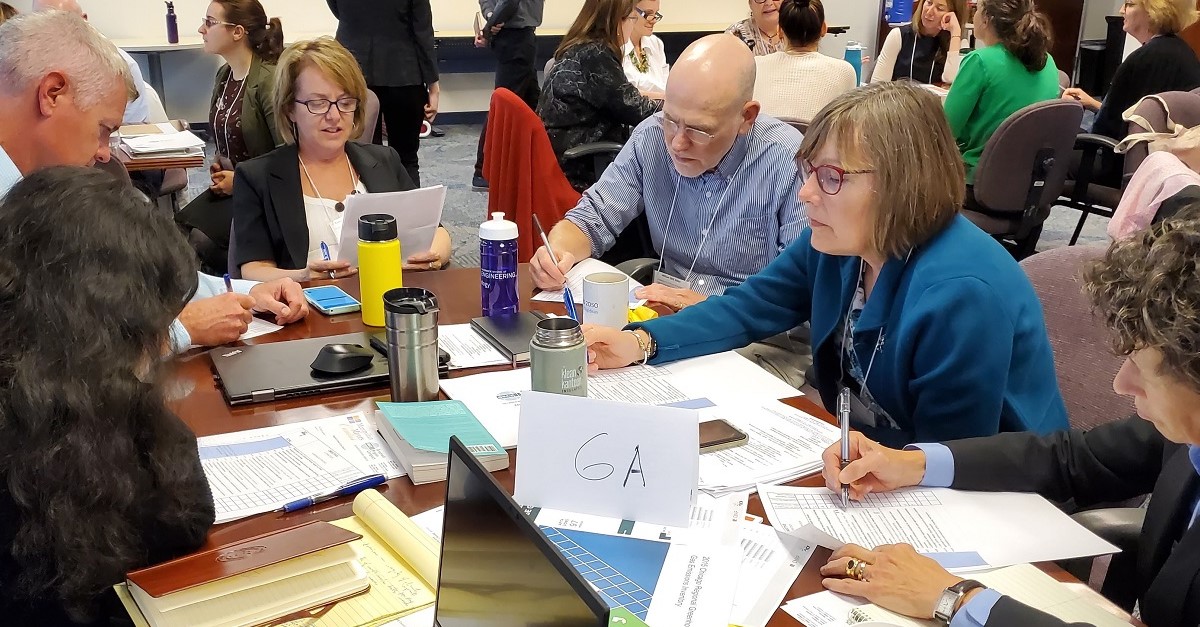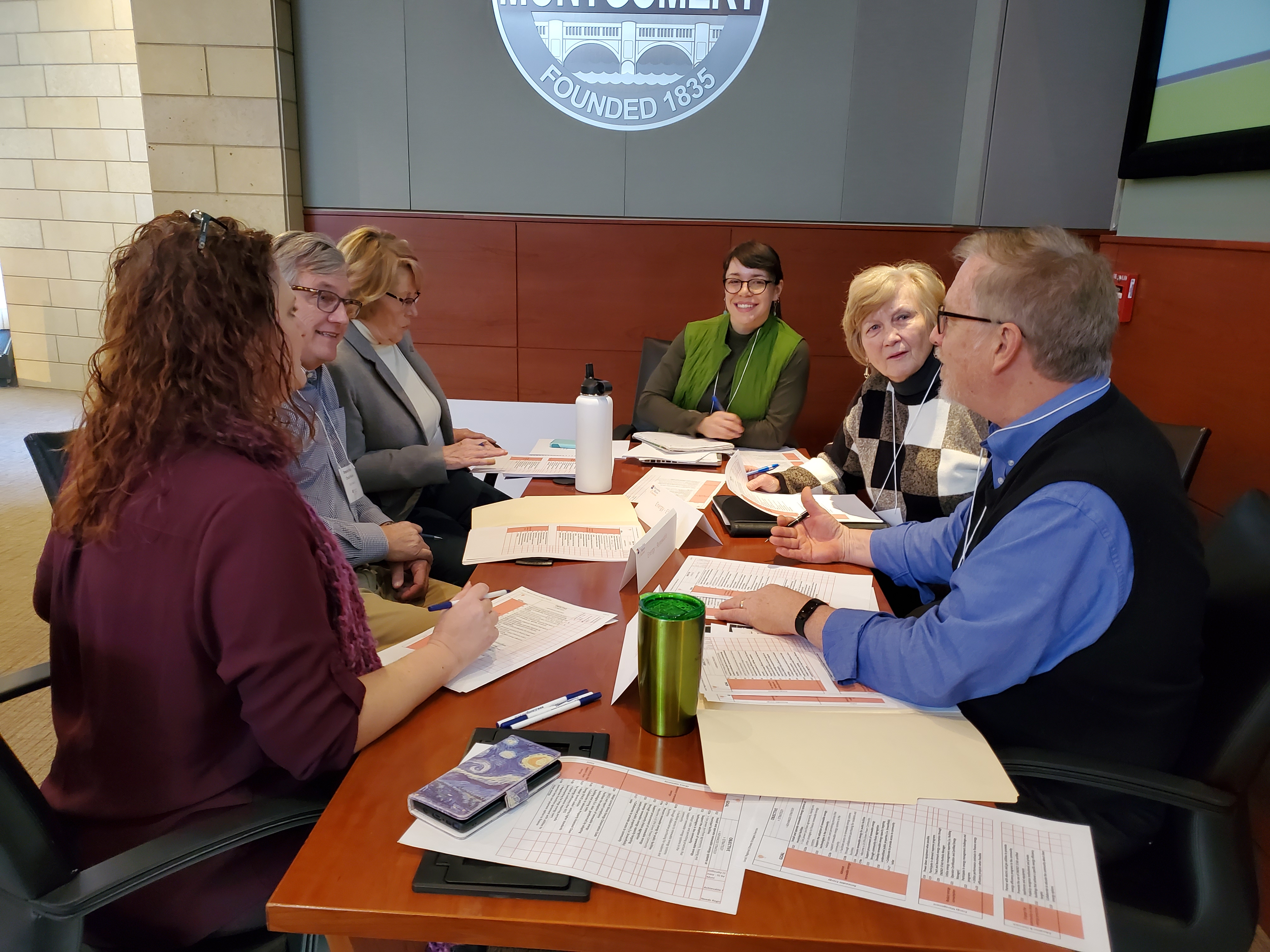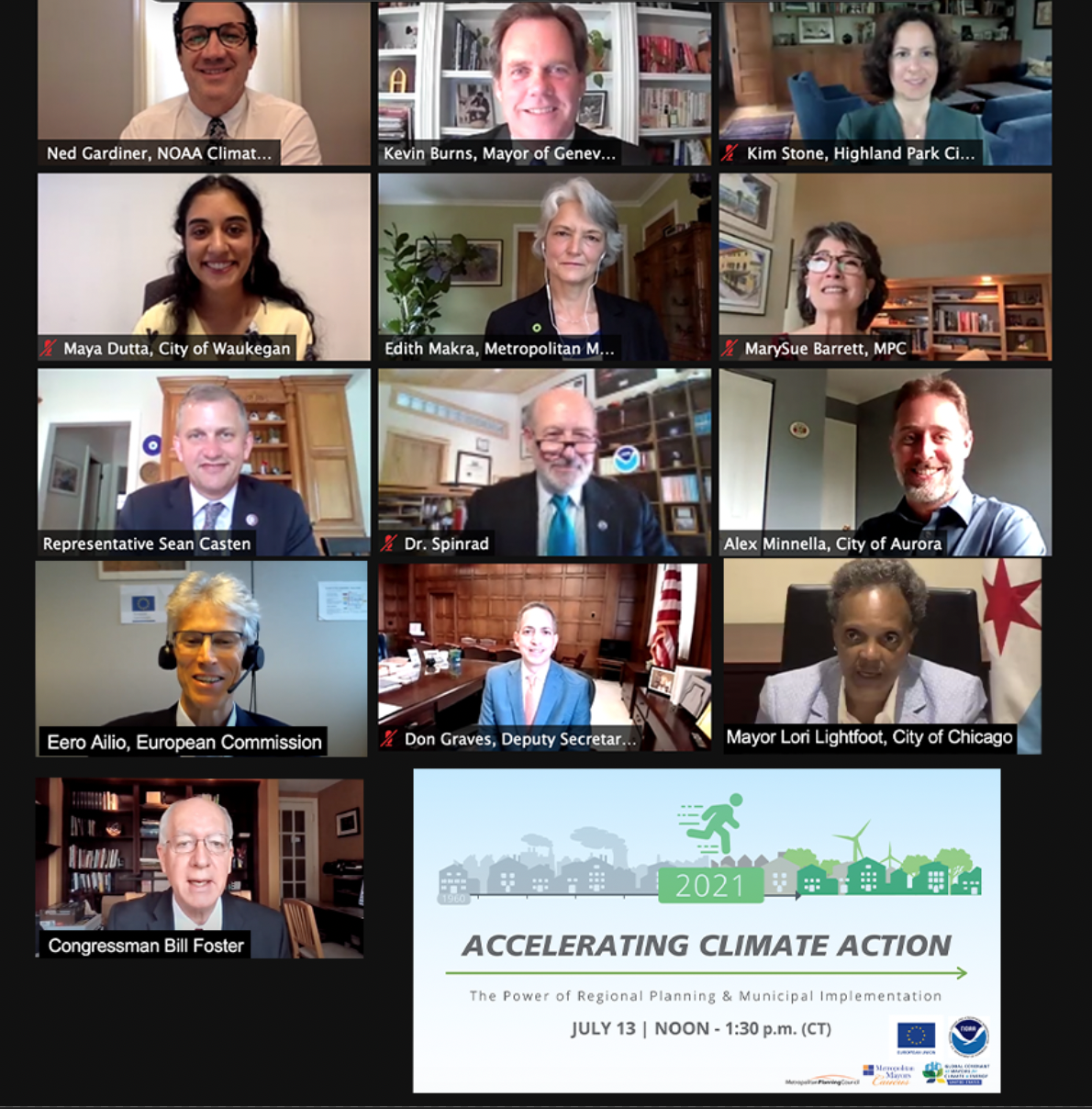
Lead, Enact, Encourage: A model for local government climate action
"We have the power and the political will to rise to meet the climate crisis. Municipal governments are uniquely positioned to lead, enact policies, and encourage others to act. For any small government, climate action is in our wheelhouse.
It's not something that you need an expert for. It is something that you as a municipality know how to do and do very well. The actions on climate are, for the most part, approachable and manageable."
Tenacity. Grit. Climate action led by communities gives us hope for an equitable future. In an interview with Slipstream, Edith Makra, Director of Environmental Initiatives for the Chicago Metropolitan Mayors Caucus, shares her vision for the power of local governments to take meaningful climate action.
What does it take to build a regional climate plan?
Collaboration, communication, and a lot of "squawking," per Makra.
While regional climate planning is successful in Europe, Oceania, South America, and Asia, it's largely absent in the United States where most resources and philanthropic activity are distributed to large cities.
"That's a great place to start," says Makra, "but what about us?" The Caucus includes 140 communities and 6.3 million people; together, they have as much might as a large international city—and just as many voices. Cue the squawking.
It was 2017 and the Caucus knew how serious things were: the climate crisis worsened, federal roles shifted, and President Trump pulled out of the Paris agreement. The Caucus heard about the C40 cities North American Climate Summit coming to Chicago—and demanded an invite. the event, Makra started talks with leaders about the urgency for a regional approach to climate action. Roughly six months later, the European Union (EU) called for pilot projects to show regional climate planning in the US.
Fourteen months? No external funding? The Caucus jumps right in.
The Caucus was the largest of four regions selected for the pilot program and the third to succeed in building their plan. Each project used the Global Covenant of Mayors for Climate and Energy (GCOM) framework and the EU offered technical assistance, support, and motivation to get through the process.
"We saw the urgency of the climate crisis and the magnificence of the opportunity and jumped right in to do it."
How did the Caucus do it? With a little help from their friends
The required community engagement focused on mitigation and adaptation. They were more comfortable with mitigation, so they started there. Their first workshop was so popular—and fun! —that they then did two more mitigation workshops. Adaption, though, was another ballgame entirely.
 |
| At the mitigation workshop the Caucus held on Jan. 21, 2020, in the Village of Montgomery, small groups worked on an activity and provided feedback that was used in the creation of the Climate Action Plan for the Chicago Region. Image credit: Cheryl Scott |
In December 2019 Makra went to a workshop through the International Society for Sustainability Professionals (ISSP) where the National Oceanic & Atmospheric Administration (NOAA) presented the adaptation framework featured in the US Climate Resilience Toolkit. They had recently helped the State of North Carolina publish a risk assessment and resilience plan, so the workshop emphasized both conceptual and practical aspects of working through assessments, assessing climate risk and vulnerability, and developing a climate plan. They were eager to work with municipalities.
Well. Why squawk when you can run?
Makra saw her opportunity, and after the presentation she tackled "poor Dr. Ned Gardiner" and his boss, David Herring from NOAA, at lunch.
"Hey, will you help us?" Makra asked.
"A whole region?" They seemed astonished.
Makra wasn't phased. "Yeah. A whole region."
By March 2019 they had informally agreed to help. And then… the pandemic hit. "So, we did it anyway," Makra laughs.
The pandemic was challenge, but not a hindrance
The caucus pivoted to hold their four adaptation workshops virtually that focused on the Steps to Resilience which helped regional leaders understand and address options for adaptation and resilience in the fact of climate-related hazards. 170 organizations, 275 individuals, and 53 municipalities took part across these workshops to answer questions like, "how do specific climate hazards relate to your community?"
 |
| Speakers at the Climate Action Plan virtual launch event on July 13, 2021. |
Armed with new ground sourced knowledge, the Caucus began with the Greenest Region Compact strategies and married them to the emerging strategies in the climate action plan.
They did their homework, too—a comprehensive literature review of global regional plans, city plans across the US, and the three existing plans in their region. They distilled out 40 succinct climate adaptation and mitigation strategies. With review testing completed, they were ready to launch. And the timing could not have been better.
"We started this in 2019 and launched the plan in July 2021. 600 people were at the launch, including mayors, congresspeople, the head of NOAA, and a representative from the European Union. When the Intergovernmental Panel on Climate Change (IPCC) report came out six weeks later, we looked brilliant for having a plan in place. very good and solid."
After the launch: How one regional climate plan inspired action
Shortly after the launch they put out a template resolution and shared it with their municipalities and the nine smaller councils of government within their region. "Like popcorn," Makra says, "these small communities that were popping up all over the place saying, ‘Yes, we support that'." What she wanted was happening: local governments engaged with the plan and acted on it.
And while that would have been reward enough, the Caucus earned a Climate Leadership Award from the Center for Climate and Energy Solutions (C2ES) for the momentum they had at the national and international level.
What about us? How small communities can build a climate plan
The Caucus built this plan by asking "hey, what about us?" and doesn't want to leave other small communities asking the same question.
"That's the magic of our plan," says Makra. "Look at the kinds of things in it and the strategies before you get intimidated about climate action. Recognize the power you have for climate action. This plan is meant to share regional research so municipalities can get to action right away."
We at Slipstream have seen smaller municipalities take on collaborative energy plans, as when seven communities in Dane County came together to identify and prioritize near-term actions for reducing energy and carbon in their respective communities. And the three levers of the Caucus's climate plan, borrowed from the Kansas City regional climate plan, can apply in any community:
- Lead by making changes to their own operations.
- Enact local codes and policies that accelerate investment and adoption of clean energy and climate adaptation solutions
- Encourage others—constituents, businesses, and other levels of government—to take climate action.
Be tenacious. Have grit. Makra closed our interview with an example of these characteristics at work.
The Caucus proposed that public agencies subscribe to community solar projects being developed in Illinois for their facilities. That idea didn't succeed, largely because there were no financial incentives for municipalities to switch their power source. So the Caucus pivoted: could they instead offer community solar subscriptions directly to residents?
Now 16 municipalities offer community solar with 5,000 homes subscribed.
| The Metropolitan Mayors Caucus community solar program gives residents the option to subscribe to community solar projects in the state, such as this Soltage project in Cortland, Illinois. Image credit: Soltage |
The Caucus's work inspires us: local and regional governments can make change happen. The Climate Action Plan for the Chicago Region is an impressive model that other local governments can take to design their own plans.
Just remember, don't forget to squawk.